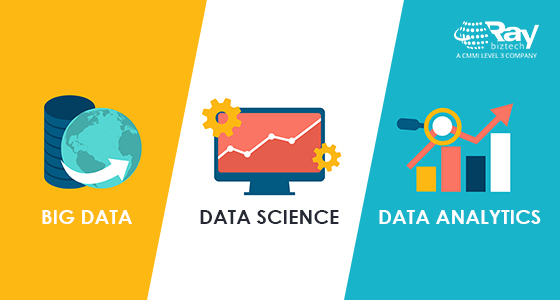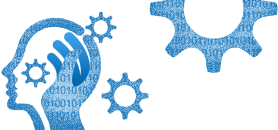What are Big Data, Data Science, and Data Analytics?

The advancements in machine learning and artificial intelligence have boosted prospects of automation and highlighted the significance of data in a fast-evolving business environment. Data is poised to play an important role in the enterprises of the future, with businesses looking to scale up production and recover costs with maximum efficiency and minimum by leveraging powerful predictive models. The dependability on data has increased ever since customers and businesses started interacting in real-time, by leveraging diverse technology platforms. According to a forecast for the year 2020, data has been growing at a mind-boggling rate. By then, new data –at least the size of a standard audio track - will be created every second for each living human on the planet.
Big Data
Large sets of structured and unstructured data require complex methodologies for processing, and can be handled efficiently using sophisticated software and tools that can facilitate their storage and retrieval. Specific Big Data applications such as Hadoop allow enterprises to automate their processes and pursue rapid business transformation. Big Data tools are used extensively across service-oriented sectors such as telecommunications, banking and retail; in addition to several more.
- Banking: As hundreds of account-holders as well as customers opt for diverse sets of policies, it becomes difficult to collate large sets of data with the use of legacy systems or disparate applications. As such, banks, financial institutions, insurance firms, and wealth management advisories are increasingly adopting advanced data analysis and mining techniques and recruiting highly skilled workforce in Big Data.
- Retail: With newer schemes and marketing offers to attract customers, Big Data helps retailers understand the buyer behavior and choice of goods across specific segments, age-groups, and regions. By leveraging advanced data techniques, retailers are able to stay competitive and deliver an improved level of satisfaction across customer touch-points including subscription/check-n, purchase, payments, and after-sales.
- Telecommunications: As faster means and advanced means of telecom services hit the market, customer-generated data is created day-in and day-out. Telecom operators are increasingly relying on data-driven methodologies to track billings and modes of payments, as well as gauge customers’ preferred usage patterns. Big Data allows companies to expand customer base with new options for pay-packs based on optimized usage tariffs, and other bundled services such as data connection.
Data Science
The principals that govern data assortment, processing, and analysis, driven by well-defined algorithms and business engine rules; are collectively studied as Data Sciences. This area of knowledge manifests as an ‘umbrella’ of principles from statistics, programming, and data extraction along with underlying data analysis. This allows us to consider a range of possible business scenarios in order to choose the most viable option and the most recommendable action.
Data Sciences is being applied in a number of powerful technology products and application-based scenarios. Few of the prominent ones are listed below:
- Search Engines: Users key in relevant keywords while search engines are programmed to return the most optimum results based on advanced algorithms built around complex Data Science tools.
- Customer Personalization: Data Science can power intelligent ‘recommender’ systems to help customers select the most viable option from a range of, say, about a billion products. Such systems are equipped to deliver greater user experience and timely suggestions based on a history of previous visits.
- Digital Advertisements: Data Science is capable of powering almost all the forms of digital advertisements. This enables choosing the most effective display banners and electronic online billboards at the right time to the relevant target audience.
A capable Data Scientist is supposedly well-versed with several associated disciplines, including in-depth knowledge of statistical techniques and advanced tools such as SAS or R, along with the Hadoop data-processing platform and proficiency in Python language, along with zeal to work with unstructured and scattered forms of data.
Data Analytics
The various forms of processed data and the diverse insights that can be generated can be applied in numerous ways, thanks to advanced forms of data skewing and number crunching that are driven by advanced analytics. This helps in drawing inferences and meaningful patterns on customer behavior in order to achieve short-term and well as long-term objectives with respect to overall business strategy in terms of market penetration, pricing, and product differentiation.
A number of businesses currently leverage Data Analytics in order to streamline their processes and key objectives:
- Healthcare: The application of Analytics in healthcare would bring improvements in quality patient care, as it would be easily possible to generate health-metrics and interpret real-time data on patients’ condition. Powerful analytics will also help increase the efficiency of tools and techniques with reliable data on instruments. Consequently, a study concludes analytics can bring about $63 billion in yearly healthcare savings on a global scale.
- Gaming: The entertainment and leisure industry leverages Analytics to build competency and achieve strategic results that can offer the most preferable leisure and entertainment options for end-users. For example, powerful analytics can create several possibilities and simulations for with inherent scenarios for a gaming app, powered by efficient processing of logic controls in tandem with actions or moves of the player.
- Travel: Firms can target holiday packages and options for customized tours by analyzing insights from available data-sets of travelers and their favorite destinations. This helps in focusing on core businesses and boosting conversions from user visits. From the customer perspective, powerful analytics help in making the best choice from a range of options in a particular holiday season.
- Energy and Utilities: A set of millions of data-points can control a vast number of switches and hubs in a typical upstream oil supply network. Further, data analytics can also be leveraged to send timely and actionable insights on outages and smart-grid performance that help monitor distinct delivery and allows cut-down of costs and minimize errors in energy optimization.
About Raybiztech
Raybiztech is a leading Global Information Technology (IT) Services and Solutions, a CMMI Level 3, ISO 27001:2022 Certified Company. We are a Member of NASSCOM, HYSEA, NJTC, and AIIA. Raybiztech offers comprehensive end-to-end IT Services for Business Application Development, Enterprise Solutions, Enterprise Collaboration Services, Testing and Quality Assurance Services, Cloud Computing and IT Infrastructure Management to organizations in the Banking & Finance, Insurance, Healthcare, Manufacturing, Retail, Media & Entertainment, Leisure & Travel, Telecom and Energy & Utilities verticals as well as Independent Software Vendors.

